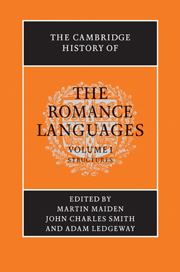Book contents
- Frontmatter
- Introduction
- 1 ROMANCE LINGUISTICS AND HISTORICAL LINGUISTICS: REFLECTIONS ON SYNCHRONY AND DIACHRONY
- 2 SYLLABLE, SEGMENT AND PROSODY
- 3 PHONOLOGICAL PROCESSES
- 4 MORPHOLOGICAL PERSISTENCE
- 5 MORPHOPHONOLOGICAL INNOVATION
- 6 CHANGE AND CONTINUITY IN FORM–FUNCTION RELATIONSHIPS
- 7 MORPHOSYNTACTIC PERSISTENCE
- 8 SYNTACTIC AND MORPHOSYNTACTIC TYPOLOGY AND CHANGE
- 9 PRAGMATIC AND DISCOURSE CHANGES
- 10 WORD FORMATION
- 11 LEXICAL STABILITY
- 12 LEXICAL CHANGE
- 13 LATIN AND THE STRUCTURE OF WRITTEN ROMANCE
- 14 SLANG AND JARGONS
- Notes
- References and bibliographical abbreviations
- Index
14 - SLANG AND JARGONS
Published online by Cambridge University Press: 28 May 2011
- Frontmatter
- Introduction
- 1 ROMANCE LINGUISTICS AND HISTORICAL LINGUISTICS: REFLECTIONS ON SYNCHRONY AND DIACHRONY
- 2 SYLLABLE, SEGMENT AND PROSODY
- 3 PHONOLOGICAL PROCESSES
- 4 MORPHOLOGICAL PERSISTENCE
- 5 MORPHOPHONOLOGICAL INNOVATION
- 6 CHANGE AND CONTINUITY IN FORM–FUNCTION RELATIONSHIPS
- 7 MORPHOSYNTACTIC PERSISTENCE
- 8 SYNTACTIC AND MORPHOSYNTACTIC TYPOLOGY AND CHANGE
- 9 PRAGMATIC AND DISCOURSE CHANGES
- 10 WORD FORMATION
- 11 LEXICAL STABILITY
- 12 LEXICAL CHANGE
- 13 LATIN AND THE STRUCTURE OF WRITTEN ROMANCE
- 14 SLANG AND JARGONS
- Notes
- References and bibliographical abbreviations
- Index
Summary
Romance terms for ‘slang’ and their history
Gergon(s); jargon; gergo (gergone); jergaljergón, jerigonza
Cardona (1988:91) had hypothesized that OFr. jargon (vs. jargonner ‘to chatter, to chirp’), Sp. jerigonza, etc., originated in a series of words that indicated the ‘chirping’ of small birds. However, the initial point in the chain is not OFr. jargon, as Wartburg [FEW] (1959–: IV, 59) would have it, but rather OPrv. gergons, which appears in the Donatz Proensals of the latter half of the twelfth century (cf. l.188 ‘gergons, gergons … vulgare trutanorum’ [‘jargon, jargon … beggars' talk’]; l.2754 ‘gergons uulgare trutanorum’ [‘jargon [is] beggars' talk’]). Marshall (1969:265, n) supposed that Spitzer's original etymology based on *gargonike < *garga ‘throat’, accepted by Meyer-Lübke (REW 3685), was inappropriate, but since we now know that OPrv. gergons antedates the OFrench form and that Franco-provençal admits palatalization of velars before the low vowel /a/, there is no incongruency in postulating a development (REW 3685a) *garg- > *garga ‘throat’, etc. > *gargonike > OPrv., OFr. gergons (parallel to REW 7370 romaānıce > OPrv./OFr. romans/romanz). Chronological priority must, then, be given to the OProvençal form, whence OFr. gergon (shortly after 1200) > ModFr. jargon, OSp. girgonz (> gerigoniza), Pt. gerigonça, etc. The more or less direct source of the OSpanish and Portuguese forms is obviously, however, OFr. gergon/jargon. Its first French appearance is dealt with in Godefroy (1885: IV, 636C), and, as Cardona stated, is occasionally (e.g., in Marie de France) associated with birdsong (cf. references to jargon in Godefroy 1885 and Tobler and Lommatzsch 1925).
- Type
- Chapter
- Information
- The Cambridge History of the Romance Languages , pp. 660 - 681Publisher: Cambridge University PressPrint publication year: 2010
- 1
- Cited by



